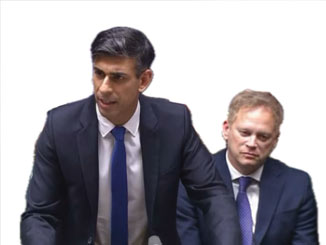

by Imtiaz Popat
Tory deputy chairs quit over Rwanda bill as Sunak suffers big rebellion Prime minister wins crucial Commons vote.
Asylum seekers arriving in the UK would be sent to Rwanda, to have their claims processed there, during a five-year trial. If successful, they could be granted refugee status and allowed to stay. If not, they could apply to settle in Rwanda on other grounds, or seek asylum in another “safe third country”.
Rishi Sunak has insisted his plan complies with international law © House of Commons/UK Parliament/PA Tory deputy chairs quit over Rwanda bill as Sunak suffers big rebellion with 60 rebel Tory MPs attempting to force him to toughen up his Rwanda asylum legislation.
Lee Anderson and Brendan Clarke-Smith resigned before they were sacked, as they joined 58 other Tory MPs in backing a rebel amendment intended to ensure asylum seekers are sent to Rwanda without delay.
Sunak defeated the rightwing Tory rebels in the House of Commons by 529 votes to 68 thanks to the backing of Labour and other opposition parties, which oppose the Rwanda bill in principle. But the prime minister’s victory came at a high political price, with Tory divisions on migration on full public display, vitriol flying between the different wings of his party and his authority shaken.
The critical Commons vote came on a rebel amendment put forward by veteran ToryMP Sir Bill Cash that would have disapplied international law to curtail legal appeals by irregular migrants.
There were 60 Tory rebels, including Jacob Rees-Mogg and Miriam Cates, who recorded the votes but did not cast ballots. The rebels also included Jane Stevenson, who quit as a ministerial aide. Eight Northern Ireland Democratic Unionist Party MPs and two independents also backed the amendment.
Cash’s amendment would have blocked asylum seekers from trying to prevent their removal under the European Convention on Human Rights or other international treaties.
Some rightwing Conservative warned on Tuesday night they could now vote against the entire Rwanda bill when it has its crucial third reading in the Commons on Wednesday.
One former minister and rebel said: “I think there is a real danger the government could lose its majority.
What’s the point of having legislation that doesn’t work? You might as well go back and start again.” Sunak’s allies are confident that the rebels are bluffing and will not rally the 28 Tory MPs needed to vote with opposition parties to overturn the government’s working majority of 54. One ally said: “The rebels may be out in force tonight but we’re going to be OK tomorrow for [the] third reading.”
A defeat for Sunak on a central plank of his legislation would be a political catastrophe for the prime minister. Sunak’s plan aims to send asylum seekers arriving in the UK by clandestine routes to Rwanda to have their claims processed.
The bill was introduced to declare Rwanda “safe” and to make arrangements for swift removals of asylum seekers to the African nation after the Supreme Court ruled last year that the government’s policy was unlawful.
Throughout Tuesday, Tory whips were rushing through Westminster’s corridors trying to contain the Conservative revolt.
Sunak’s calculation is that Conservative MPs would be pilloried by their constituents if they rebelled and killed the Rwanda bill, which he has called “the toughest immigration law ever”.
One rightwing minister said of the rebels: “They are just not strategically very bright.
They have told the country that our policy is shit, but when it comes to the third reading vote they will abstain and look stupid.” Sunak may draw comfort from the fact that when the bill had its second reading in the Commons last month there were fewer than 30 rebel Tory abstentions and no votes against, despite much sabre-rattling beforehand.
Tory MPs who are members of the “five families” of different right-wing factions met on Tuesday night to discuss tactics.
About a dozen have so far suggested they might vote against the bill at its third reading.
